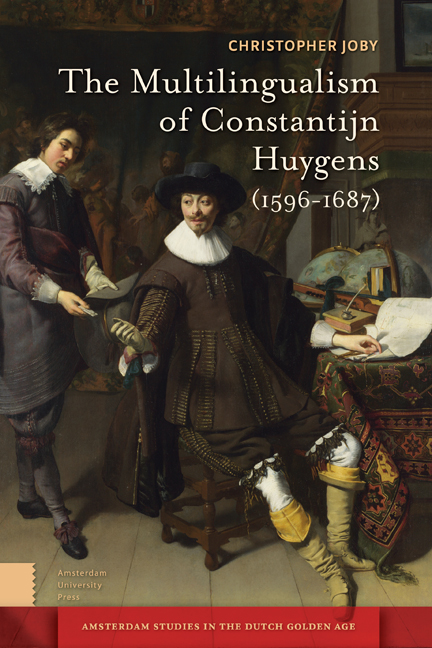Book contents
- Frontmatter
- Dedication
- Contents
- List of Illustrations
- List of Abbreviations
- Acknowledgements
- Prologue
- 1 Multilingualism: An Introduction
- 2 Huygens’s Language Acquisition
- 3 The ‘Multidimensionality’ of Huygens’s Multilingualism
- 4 Huygens’s Multilingualism in Music, Science, and Architecture
- 5 Huygens and Translation
- 6 Code Switching in Huygens’s work
- 7 The Multilingualism of Huygens’s Children
- Epilogue
- Appendix
- Bibliography
- Index
5 - Huygens and Translation
Published online by Cambridge University Press: 16 February 2021
- Frontmatter
- Dedication
- Contents
- List of Illustrations
- List of Abbreviations
- Acknowledgements
- Prologue
- 1 Multilingualism: An Introduction
- 2 Huygens’s Language Acquisition
- 3 The ‘Multidimensionality’ of Huygens’s Multilingualism
- 4 Huygens’s Multilingualism in Music, Science, and Architecture
- 5 Huygens and Translation
- 6 Code Switching in Huygens’s work
- 7 The Multilingualism of Huygens’s Children
- Epilogue
- Appendix
- Bibliography
- Index
Summary
In part as a result of the rise of vernacular languages in the early modern period, there was an increase in the amount of material being translated at this time (Burke 2004: 113). Translation was clearly a discipline of particular interest to Huygens. He wrote about it on a number of occasions and produced many translations himself. Most of what Huygens translated was poetry, and the translations he produced were primarily in verse form. However, he also translated extracts from a number of plays and collections of prose works, such as the apothegms of the English court jester Archie Armstrong, which he translated in the 1640s. He usually translated into Dutch, although Latin, French, and Italian were also target languages. As well as translating the works of other authors, Huygens produced translations of his own verse, or ‘self-translations’. In two cases Huygens wrote poems on the same subject in each of the eight languages that formed the core of his multilingualism within the space of a few days. Consideration will be given to whether these can be seen as (self-)translations or rather as parallel creative acts (cf. Hermans 2007: 19-22).
Before considering what Huygens had to say about translation and specific cases of his own translations, it will be useful briefly to discuss translation activity in the United Provinces in the early modern period in general. A recent published lecture by Peter Burke, humorously titled ‘Lost (and Found) in Translation’, provides an excellent framework for this discussion (Burke 2005/6).
Translation in the United Provinces in the Early Modern Period
In his essay, Burke raises a number of questions concerning translation in Western Europe in the early modern period, and more specifically in the United Provinces. One of these questions is what the source and target languages were for translations. Many translations were from Greek to Latin, or from Greek or Latin into vernacular languages. Cicero wrote that in his youth he would translate from Greek into Latin, and Quintilian likewise talked of using translation to train young men in the rhetorical arts (Botley 2004: 170).
- Type
- Chapter
- Information
- The Multilingualism of Constantijn Huygens (1596–1687) , pp. 177 - 220Publisher: Amsterdam University PressPrint publication year: 2014



